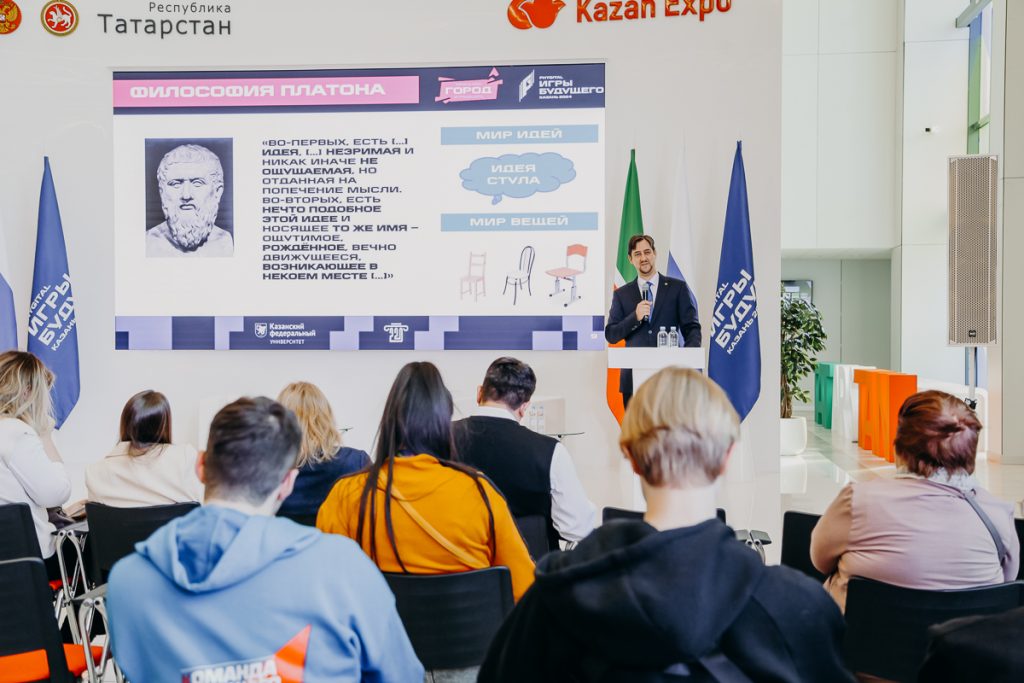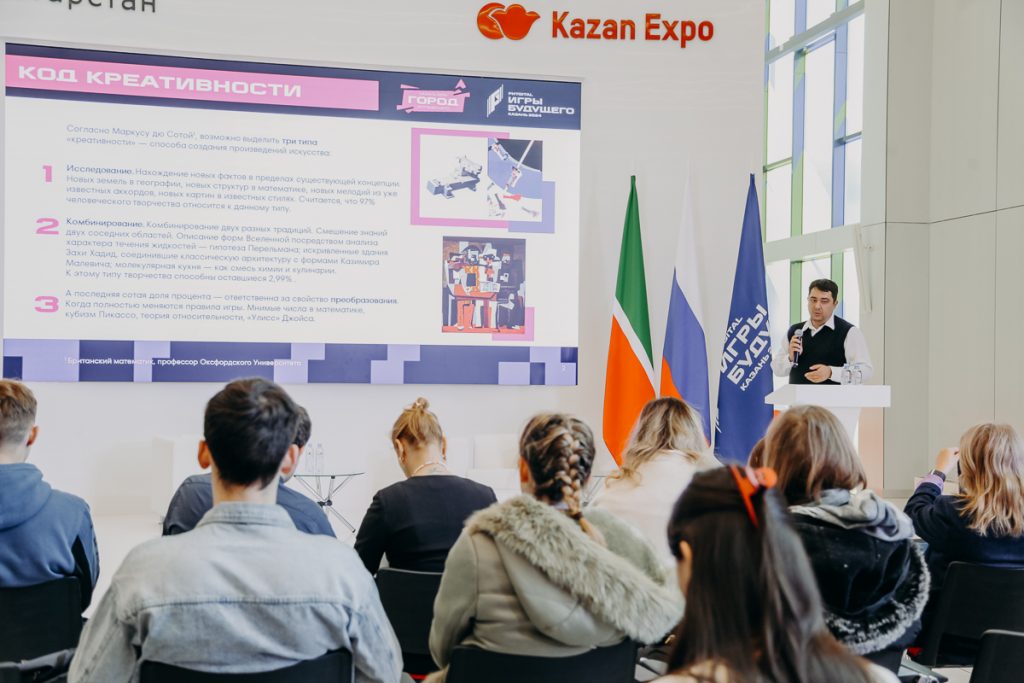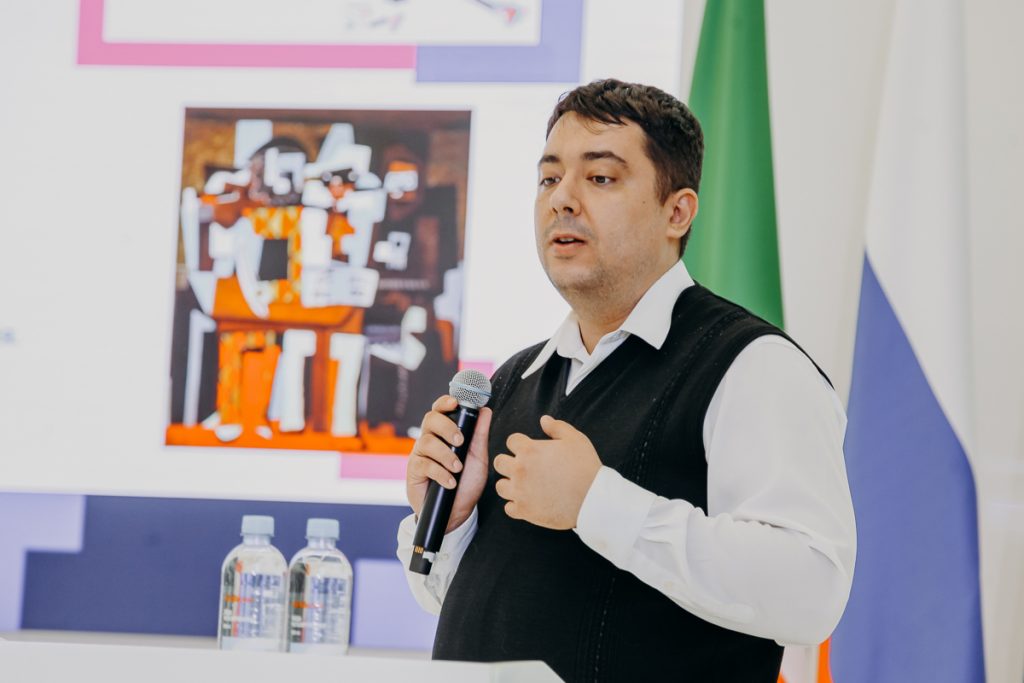KFU lecturers share knowledge about IT at Phygital Games of the Future 2024
Director of the Institute of IT and Intelligent Systems Mikhail Abramsky and Director of the Institute of AI, Robotics and System Engineering Dmitry Chikrin visited the Games’ Future City, a popular science thematic zone, on 27 February.
Mikhail Abramsky’s lecture was called Inspired by Phygital. Knowledge, skills and habits to borrow from IT to your life.


IT is an artificial product, and the functionality of the digital sphere was based on the objects of the real world. According to Abramsky, the IT sphere does not invent new words, but only rethinks existing ones. For example, the conceptual apparatus of IT specialists consists mostly of commonly used words – ‘architecture’, ‘bridge’, ‘overload’, ‘single’, ‘sugar’, ‘salt’, and many others.
Some terms are taken from linguistics, such as language, syntax, prefix, or alphabet.
Plato’s philosophy that there are two worlds – the world of things and the world of ideas – is also reflected in the IT industry.
“Plato came up with this a long time ago, and we use it when we write code. In programming, we write a class – this is some ‘idea’ of some program entity, and then we create an object of this class – a ‘thing’,” Abramsky explained.
In 1946, American engineer Grace Hopper, while investigating the cause of a computer malfunction, discovered a moth in a relay. After that, “bug” became fixed in the programmers’ lexicon as an error in the code.
He then talked about how contemporary technology can help save the most important resource – time.
“Generate! Use the tools of large language models (LLM) as well as neural networks that generate texts or images as long as it is still possible and practically painless,” urged the expert.
Abramsky reminded the audience about the rules of digital hygiene, namely taught how to protect themselves from cybercriminals and check their inboxes for leaks, as well as talked about Agile, Kanban and Scrum methodologies that will help increase efficiency in work.
“Esports is a very important area for us, as video games are what we do. We love the mix of digital and real world, everything about synergy. Any mix allows for an outside perspective on each area, for example, for a cybersport athlete, participating in phygital games is an opportunity to transfer their values to traditional sports. For a physical athlete, it’s a chance to realize that esports is also a sport,” he concluded.
Dmitry Chikrin’s lecture was titled AI and machine art.


According to him, a work of art is the result of one of three processes – research, combination, or transformation. The last process – transformation – happens very rarely, when the rules of the game change completely.
“Examples of such transformations are imaginary numbers in mathematics, which were so originally named because they were not supposed to exist. These are Lobachevsky’s intersecting parallel lines, James Joyce’s novel Ulysses, which has no beginning and no end and is generally looped in its exploration, Picasso’s cubism. That is – it is when the one who produces the product of creativity completely changes the existing rules of the game, such a thing has never been created before it,” he said.
The speaker noted that modern AI does not yet pose a particular danger to humans, which has been widely discussed in recent years.
“They are, strangely enough, pure humanitarians and are practically incapable of making precise calculations, but they are the ones who can create. It feels like they are emotional entities that actually have no logical thinking. They are capable of outbursts of emotion, often their behavior is far from rational. The essence of consciousness is what it learns and creates from – it is that body of artwork, corpuses of text and everything else. What we have trained artificial intelligence on, that is what it has become. This is an absolutely astonishing development, to which very little attention, from my point of view, is now being paid by classical psychology,” continued Chikrin.
Then there was a question concerning the ethics and philosophy of artificial intelligence, how important it is to regulate this sphere at the legislative level, and whether this will not hamper the development of AI. Chikrin replied, “The only thinker in the field of artificial intelligence and robotics who was right about what would happen with AI was Isaac Asimov. Once thinking robots were created, they became the image and likeness of humans, and any logic that applies to humans became applicable to them. If we look at Asimov, either we immediately identify the fundamental principles of robots’ functioning, which are written at the level of rigid logic and represent insurmountable barriers, or, otherwise, we get a situation similar to the one considered in the Matrix trilogy.”

